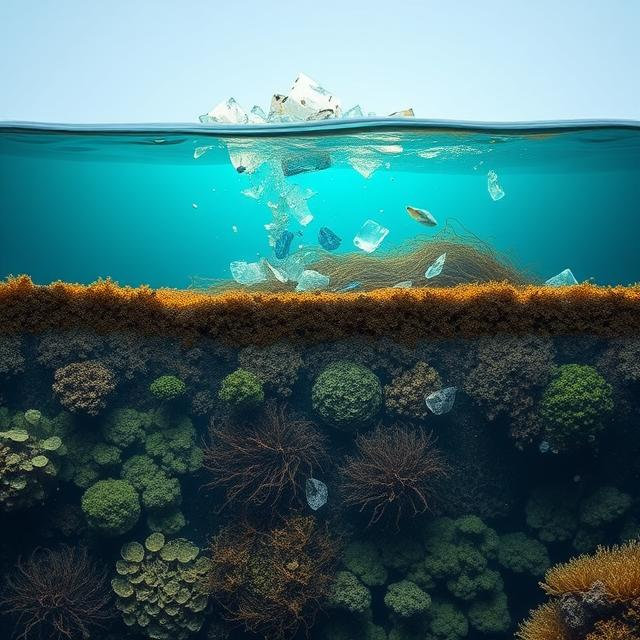In their latest report titled ‘Leaving the shore: Marine-based substitutes and alternatives to plastics’, UNCTAD has stressed the importance of transitioning to Marine-based substitutes (MBSAs). MBSAs refer to materials derived from marine resources, such as seaweed, algae, marine minerals, and other oceanic invertebrates and plants, that can serve as alternatives to conventional plastics. These substitutes are biodegradable and have a lower environmental footprint compared to fossil fuel-based plastics. By leveraging the natural capital of marine ecosystems, MBSAs offer a promising pathway to mitigate plastic pollution while promoting sustainable development.
How Marine-Based Substitutes Address Plastic Pollution
Plastic pollution has become a critical global issue, threatening marine ecosystems, human health, and economic stability. The accumulation of plastic debris in oceans poses severe risks to marine life and coastal communities. Marine-based substitutes provide an innovative solution by replacing conventional plastics with materials that naturally decompose and integrate into the environment without causing harm.
Key examples of MBSAs include:
– Algae-Based Biopolymers: These are used in creating bioplastics for packaging and textiles. They are biodegradable and have strong functionality, such as flexibility and durability.
– Marine Minerals: These serve as fillers in glass and ceramics, reducing reliance on synthetic polymers.
– Seaweed-Based Products: Seaweed farming supports the creation of sustainable packaging materials while also contributing to economic diversification in coastal regions.
Environmental Benefits of MBSAs
Marine-based substitutes are notable for their biodegradability and reduced carbon footprint during production. Unlike conventional plastics that persist in the environment for hundreds of years, MBSAs break down naturally, minimizing ecological disruption. For instance:
– Algae-based bioplastics can reduce plastic waste significantly.
– Seaweed farming enhances carbon sequestration while providing raw materials for sustainable products.
However, the exploitation of marine resources must be carefully managed to avoid negative impacts such as habitat depletion, ocean acidification, or chemical pollution from unregulated seabed mining.
Socio-Economic Advantages
The adoption of MBSAs can foster economic growth and job creation, particularly in coastal regions and Small Island Developing States (SIDS). Key socio-economic benefits include:
– Employment Opportunities: Seaweed farming and MBSA production create jobs for local communities.
– Economic Diversification: Coastal economies can expand beyond traditional industries by tapping into marine resources.
– Empowerment: Women and youth often benefit from new opportunities in sustainable industries tied to MBSAs.
Challenges to Market Development
Despite their potential, MBSAs face several barriers to widespread adoption:
1. High Costs: The production of marine-based substitutes is currently more expensive than conventional plastics.
2. Technological Limitations: Advanced technologies are needed to scale up MBSA production efficiently.
3. Regulatory Hurdles: Stringent trade measures, such as sanitary and phytosanitary (SPS) requirements, increase compliance costs for companies dealing with MBSAs.
4. Market Access Issues: Tariffs and non-tariff barriers hinder the global competitiveness of these materials.
Strategies for Promoting MBSAs
To unlock the full potential of marine-based substitutes, coordinated efforts across stakeholders are essential:
– Governments should establish supportive regulatory frameworks and incentivize public-private partnerships.
– Businesses can invest in research and development (R&D) to improve cost-effectiveness and scalability.
– Civil society organizations can raise awareness about the environmental benefits of MBSAs.
– Academia can contribute interdisciplinary research to address technological challenges.
– Consumers can drive demand by choosing sustainable products and supporting eco-friendly initiatives.
Conclusion
Marine-based substitutes represent a viable solution to combat plastic pollution while fostering sustainable development. By integrating these materials into global supply chains—especially for packaging—countries can reduce their reliance on conventional plastics. However, overcoming economic and regulatory challenges will require robust policy frameworks, international cooperation, and investment in innovation. As the global market for MBSAs grows (reaching $10.8 billion in 2022), their adoption could pave the way for a cleaner planet and more inclusive economic opportunities.







